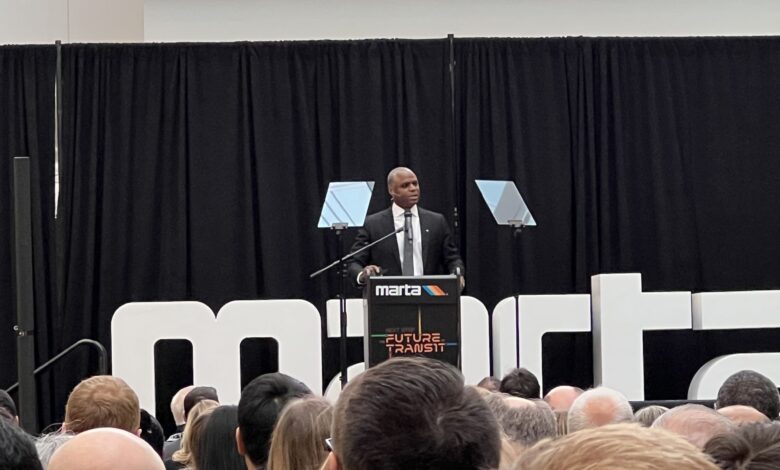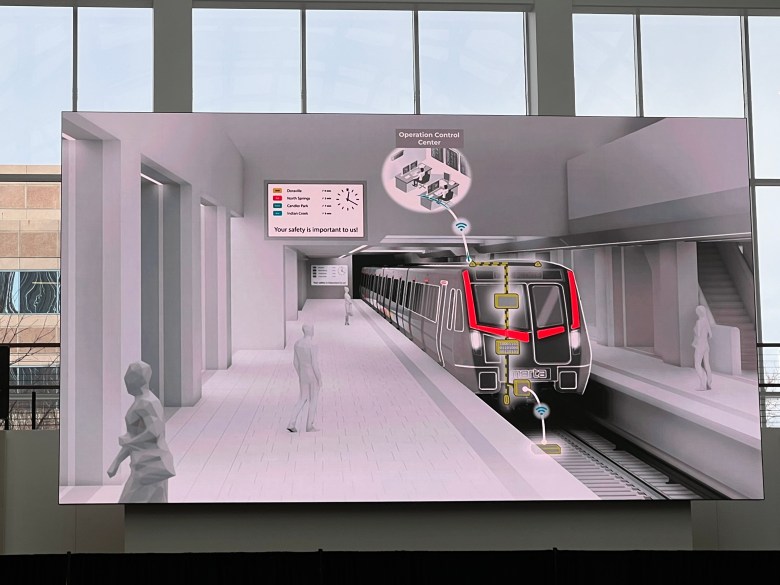MARTA’s transformative future: Next stop: The future of transit

The Metropolitan Atlanta Rapid Transit Authority (MARTA), along with the Council for Quality Growth and with support from major sponsors Axis Infrastructure, VHB, and WSP, held a State of MARTA 2025: Next Stop: The Future of Transit.
The event began at 8 a.m., with an exclusive look at the new trains at Lindbergh Center Station, followed at 9 a.m., by the State of MARTA address given by MARTA General Manager and CEO Collie Greenwood in the lobby of Uptown.
During the State of MARTA event, Greenwood laid out the transformative initiatives underway, which will define the future of transit in metro Atlanta. This will address the region’s growing population and increasing transportation needs, according to Greenwood.
“As the region prepares for an expected population increase from six million to eight million by 2050, MARTA is setting the stage for a safe, reliable, and sustainable transportation network to connect communities and reduce congestion,” he said.
Greenwood also provided a glimpse into the future of rail service with the unveiling of the first CQ400 train.
“When I stepped onto that new train this morning, it felt like stepping into the future,” Greenwood said. “These new railcars are an inspiration to everyone at MARTA and to our customers who will get to experience a cleaner and safer ride – and hopefully one that shows them how transit can make their lives easier and their trip more enjoyable. The future of transit begins now at MARTA, and the State of MARTA is strong.”
MARTA, Greenwood said, is well-positioned for the future because of its strong financial position.

During his State of MARTA address, Greenwood laid out several groundbreaking projects that will revolutionize the transit experience for riders:
· CQ400 Railcars: The new ultramodern railcars feature open gangway designs, upgraded lighting and seating, digital displays, charging stations, and improved safety measures. These cars symbolize MARTA’s commitment to modernization and innovation, with the first batch arriving for testing and planned deployment later this year.
· Communications-Based Train Control (CBTC): This cutting-edge technology will improve rail safety, efficiency, and on-time performance, making MARTA one of the most advanced transit systems in the country.
· Zero-Emissions Vehicles: MARTA Rapid Bus Rapid Transit (BRT) lines will feature zero-emissions vehicles equipped with wireless charging, custom interiors, and ADA-friendly platforms and debut along the Summerhill corridor this year. These vehicles are a key step toward sustainable and efficient transit.
· NextGen Bus Network: MARTA’s comprehensive bus network redesign will offer faster, more reliable service. Frequent service routes will expand from 5 to 18 corridors, providing 15-minute service to 245 percent more riders. The new network will also feature consistent seven-day service and 12 on-demand zones for underserved areas.
· Fare Payment Upgrades: MARTA’s AFC 2.0 system will allow riders to use credit cards, smartphones, and smartwatches for seamless entry. Enhanced faregates will improve security and accessibility, marking a significant step forward in customer convenience.
Greenwood also established MARTA’s vision to extend beyond infrastructure to creating a safe, clean, and reliable experience for riders through:
· Safety Innovations
· Transit-Oriented Development (TOD)
· Technology Upgrades
Furthermore, MARTA is undertaking its largest system expansion and modernization effort since its founding, with efforts underway to complete:
· New MARTA Rapid Lines: Construction is underway on the MARTA Rapid Summerhill line, with added lines planned for Campbellton Road, Southlake, and SR-54. These projects aim to transport riders more efficiently through congested areas and connect them to the larger MARTA network.
· Transit Hubs: New transit hubs in Clayton County, South DeKalb, and Stonecrest will improve connectivity and access for bus customers.
· Station Modernization: MARTA is investing $1 billion to upgrade all 38 rail stations and will soon begin a transformative project at Five Points Station to create a transit hub and city center.
Greenwood also discussed how MARTA is committed to preparing future leaders through partnerships with organizations like Cristo Rey High School, which offers students valuable work experience. Initiatives such as MARTA’s Apprenticeship Program for bus technicians are also helping to build rewarding careers in transportation while supporting the system’s expansion.

Additionally, as Atlanta prepares to host the 2026 World Cup and the 2028 Super Bowl, MARTA’s investments will play a critical role in ensuring seamless transportation for millions of visitors.
“The future is now, and it’s happening at MARTA,” MARTA Board Chair Jennifer Ide said. “We are breaking ground, launching innovative services, and expanding our system to meet the needs of our growing region. Together, we’re building a brighter, more connected future for metro Atlanta.”
For those individuals excited to see the new trains in action, MARTA will begin testing them later this year, with a full rollout expected in early 2026.
For more information, visit https://www.itsmarta.com/Default.aspx.



